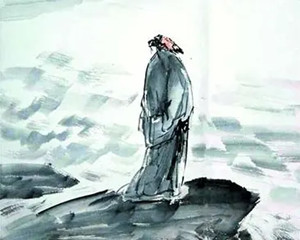《蓝田县丞厅壁记》是唐代文学家韩愈于元和十年(815年)创作的一篇散文。文章通过描写吏丞间行文署名和崔斯立任县丞时所作所为,揭露讽刺了唐代县丞一官无所事事形同虚设,消磨志士的真相,有一定的认识意义。文章突破传统厅壁记的成例,用一系列生动具体的细节,对人物进行描写,生动传神,发人深省。全文短小精悍,生动泼辣,意味深长。

韩愈·《蓝田县丞厅壁记》
丞之职所以贰令,于一邑无所不当问。其下主薄、尉,主薄、尉乃有分职。丞位高而逼,例以嫌不可否事。文书行,吏抱成案诣丞,卷其前,钳以左手,右手摘纸尾,雁鹜行以进,平立睨丞曰:"当署。"丞涉笔占位,署惟谨,目吏,问:"可不可?"吏曰:"得",则退,不敢略省,漫不知何事。官虽尊,力势反出主薄、尉下。谚数慢,必曰"丞",至以相訾謷。丞之设,岂端使然哉?
博陵崔斯立,种学绩文,以蓄其有,泓涵演迤,日大以肆。贞元初,挟其能战艺于京师,再进再屈千人。元和初,以前大理评事言得失黜官,再转而为丞兹邑。始至,喟曰:"官无卑,顾材不足塞职。"既噤不得施用,又喟曰:"丞哉,丞哉!余不负丞,而丞负余。"则尽枿去牙角,一蹑故迹,破崖岸而为之。
丞厅故有记,坏漏污不可读。斯立易桷与瓦,墁治壁,悉书前任人名氏。庭有老槐四行,南墙巨竹千梃,俨立若相持,水虢虢循除鸣。斯立痛扫溉,对树二松,日吟哦其间。有问者,辄对曰:"余方有公事,子姑去。"
[考功郎中、知制诰韩愈记。]
Written on the Wall of the Assistant Magistrate's
Han Yu
The assistant magistrate's task is to help the magistrate and look into everything that goes on in his county. Under him are secretaries with various functions. But though his status is high, he is too cribbed and encumbered to take any action. When a document has to be issued, the clerk brings it to him—made out. Holding the forepart of the scroll tightly rolled in his left hand, he pulls out its end with his right, swoops down on the assistant magistrate and looks at his askance. "Your signature, please!" he says. The assistant magistrate picks up his brush and signs with care in the allotted place, glancing at the clerk for reassurance. "All in order," says the clerk, and withdraws. The assistant magistrate dares not look into the matter and has no idea what is at issue. Though his position is high, he has less authority than the secretaries. But he is usually the first to be criticized, and is sometimes roundly abused for negligence. Is this why they created such a post?
Tsui Szu-li of Poling cultivated the arts and stored his mind with learning, broadening and deepening his knowledge from day to day. At the beginning of the Chen Yuan era, when he went to prove his worth at a test in the capital, he came first in two examinations. At the beginning of the Yuan Ho era, for a word out of season he was dismissed from the Supreme Court where he was a judge, and transferred to be assistant magistrate of this county. Upon his arrival he sighed and said: "This post is not too low, but I may not prove up to it." When he found his hands tied he sighed again and said: "What an appointment! I am not thankless, but this is a thankless task." Then he took pains not to be sharp or cutting, trod in his forerunners' steps, and stood on no ceremony.
An old wall inscribed with names in the magistrate's office was so dilapidated, cracked and soiled that the writing on it was illegible. Tsui replaced the beams and tiles, repaired and plastered the wall, and recorded all his predecessors' names. In the courtyard were four rows of old ash trees, and a thousand fine bamboos ranged solemnly by the south wall as if in attendance, while water gurgled past the steps. Tsui cleaned the place thoroughly and planted two pines in front of his office, where he chanted poetry every day. When asked any question he made haste to answer: "I am busy with affairs of state. Please go away!"
(杨宪益、戴乃迭 译)
更多精品翻译素材,敬请关注可可英语。












